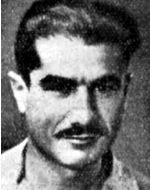Ben-Yosef, Zvi-Menachem
Son of Sabina and Yosef Dresler, was born on April 22, 1914 in the city of Sasov, Poland. At a young age he moved with his family to Vienna. In Vienna he attended an elementary school, moved to the Albert Gymnasium, and in 1932 he passed his matriculation exams. As a boy he had a musical talent. From 1934 to 1932, he studied at the University of Vienna in the Faculty of Art, History and Music, and studied piano and composition for many years with the famous Jewish musician Carl Friling. In 1934 he joined the Zionist movement and in order to prepare himself for the service of the future Hebrew state he enrolled in the Consular Academy in Vienna, and in 1936 he was awarded a diploma with special honors in economics, languages and journalism. That year he left his wealthy parents’ home and immigrated to Israel as a student at the Hebrew University. When he arrived in Israel he joined the Haganah immediately. Zvi tried to be accepted into the political department of the national institutions but was unable to do so and decided to study in Jewish studies. Then, in 1938, he went to the Kiryat Anavim group, and also participated in the establishment of Ma’ale Hachamisha. With the outbreak of the Second World War and the cessation of the transfer of funds from abroad, Zvi was forced to make a living in cafes. In 1940 he volunteered for the British Army and served for over two years in Israel and North Africa. Always pushed to the first lines. His commanders found that his musical talents might be useful in another position, and demanded that he join the military entertainment band “Ansa.” Zvi refused and was not answered until the Jewish Brigade and its artistic group were established, and when he was released from the brigade in May 1946, He composed compositions of the poems of Bialik, Tchernichovsky and other poets, as well as military marches, many of which he dressed in his own words, tried his hand in composition and wrote, among other things, a sonata for clarinet. The violin, its melodies sung all over the country, and me The song “I Have a Kinneret” is well known, and he lived and fought as he did on November 29, 1947, the day of the UN General Assembly resolution. He stopped his radio activities and devoted himself to his duties in the Hagana. As a fighter he was active mainly in Jerusalem and its environs. During the battle in Gush Etzion he was a platoon leader in the Russian convent. On May 3, 1948, the Arab Legion and the Irregular Regiments carried out a heavy attack on the Bloc, one of the first targets being the Russian monastery, which was adjacent to the road. Who in his last moments sang his song: “And if in the battle of Apolla, / evil, my arms for revenge shall be taken. / Hsu! Tzvi fell on Wednesday, May 13, 1948 in the great battle of Gush Etzion. On the 17th of Cheshvan 5710 (17.11.1949), he was transferred to eternal rest in the military cemetery at Mount Herzl in Jerusalem with the rest of the Gush victims. In his memory, a prize was awarded for an excellent musical composition that will be given each year by the Committee for the Commemoration of His Memory, during a concert of his works.
